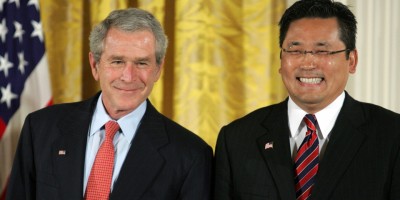The Pentagon’s Missionary Spies in North Korea

U.S. Military Used Christian NGO as Front for North Korea Espionage
On May 10, 2007, in the East Room of the White House, President George W. Bush presided over a ceremony honoring the nation’s most accomplished community service leaders. Among those collecting a President’s Volunteer Service Award that afternoon was Kay Hiramine, the Colorado-based founder of a multimillion-dollar humanitarian organization.
Hiramine’s NGO, Humanitarian International Services Group, or HISG, won special praise from the president for having demonstrated how a private charity could step in quickly in response to a crisis. “In the aftermath of Hurricane Katrina,” read Hiramine’s citation, “HISG’s team launched a private sector operation center in Houston that mobilized over 1,500 volunteers into the disaster zone within one month after the hurricane.”
But as the evangelical Christian Hiramine crossed the stage to shake hands with President Bush and receive his award, he was hiding a key fact from those in attendance: He was a Pentagon spy whose NGO was funded through a highly classified Defense Department program.
The secret Pentagon program, which dates back to December 2004, continued well into the Obama presidency. It was the brainchild of a senior Defense Department intelligence official of the Bush administration, Lt. Gen. William “Jerry” Boykin. Boykin, an evangelical Christian who ran into criticism in 2003for his statements about Islam, settled on the ruse of the NGO as he was seeking new and unorthodox ways to penetrate North Korea.
Long a source of great concern to the U.S. and Western Europe because of its nuclear program, North Korea was the most difficult intelligence target for the U.S. “We had nothing inside North Korea,” one former military official familiar with U.S. efforts in the country told me. “Zero.” But Hiramine’s NGO, by offering humanitarian aid to the country’s desperate population, was able to go where others could not.
It is unclear how many HISG executives beyond Hiramine knew about the operation; Hiramine did not respond to repeated requests for comment and neither did any of his senior colleagues. Few, if any, of the rest of the organization’s staff and volunteers had any knowledge about its role as a Pentagon front, according to former HISG employees and former military officials.
The revelation that the Pentagon used an NGO and unwitting humanitarian volunteers for intelligence gathering is the result of a months long investigation by The Intercept. In the course of the investigation, more than a dozen current and former military and intelligence officials, humanitarian aid workers, missionaries, U.S. officials, and former HISG staffers were interviewed. The U.S. government officials who were familiar with the Pentagon operation and HISG’s role asked for anonymity because discussing classified military and intelligence matters would put them at risk of prosecution. The Pentagon had no comment on HISG or the espionage operations in North Korea.
Before it was finally dismantled in 2013, Hiramine’s organization received millions in funding from the Pentagon through a complex web of organizations designed to mask the origin of the cash, according to one of the former military officials familiar with the program, as well as documentation reviewed for this article.
To Read Complete Article on The intercept click here

